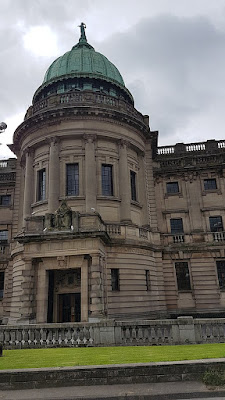 |
| Mitchell Library, Glasgow (PC: Stinglehammer, CC BY-SA 4.0 via Wikimedia Commons) |
Some of the most useful record sets in Scotland are poor law
application forms. Glasgow’s collections of these are the most extensive (over a
million records) and are name-indexed on a computer database held in Glasgow City Archives at the Mitchell Library.
I’ve been using these fantastic records for many years now,
and I tend to forget that more are being added each year, as they're released from the closure period (75 years for adults, 100 for children). So I was surprised to find a record of my
grandparents applying for help from the parish in 1924 – not that their circumstances
were unexpected, just that I hadn’t realised enough time had elapsed for their records to be available!
This was the same grandfather who I last year came across in
the British Newspaper Archives’ collection – completely by accident, as his
combination of names runs through several generations of the family – and was stunned
to learn that he had been caught red-handed with the proceeds of a burglary,
taken to court, and ended up in prison. The
newspaper accounts gave enough detail for me to know that he was working away from home at the “berry picking” on a farm in
Perthshire, and had been trying to pawn one of the “hot” stolen items in
Stirling. Police followed his trail to
the farm and arrested him, and he was tried at Perth Sheriff Court and
sentenced to fourteen days in jail.
Strangely enough (!), he does not mention any of this in the poor law application on my grandmother’s behalf, made just a few months later. He surely knew that if he confessed to any of the above, the inspector assessing his case would be much less likely to look favourably upon his application for parish support. Already noted as being against him were the fact that he hadn’t served in the army, and was currently “idle” i.e. out of work and claiming unemployment benefit.
The reason for the application was that my grandmother was
in labour with her second child and they couldn’t afford the medical fees, this
being in the days before the National Health Service. Granddad made his request for assistance at
5.40am on the morning of November 18th, 1924, and the documents
confirm that the baby was born later that day in Oakbank Hospital in the north
of the city. A note at the foot of the
page below shows that he was expected to pay £1 for the medical treatment, in
weekly instalments of five shillings.
 |
| Photo courtesy of Glasgow City Archives |
This “Particulars of Settlement” document was a standard part of the poor law paperwork, and it listed the couple’s past addresses - this was to prove they were entitled to receive support from the parish granddad was applying to. It also conveniently gives the reference number of his own parents’ previous application documents.
Interestingly, among the list of previous addresses –
and as this was an application on behalf of my grandmother, she at least would
have been living there – was a farm in Auchterarder, in Perthshire. It isn’t named in the newspaper reports, but
I suspect this was the place where the law caught up with granddad – and what
on earth was he playing at, dragging my heavily-pregnant grandmother around the
country, earning money by picking fruit?!
The schoolhouse he burgled was in the same area, too. I had a mental image of granny working in the
fields while he wore a mask and striped jersey to break in and steal a lady’s
gold watch, a rare Indian scarf pin, binoculars, and clothing (according to the
Sunday Post).
It’s extremely satisfying when two totally unrelated sources corroborate each other like this.
It also paints a sad picture of life on the poverty line in 1920s
Glasgow, although not to excuse granddad’s behaviour, it was a definite red
flag. He eventually abandoned his wife and three children (now including my own
mother) and left them to look after themselves – which my granny did, and a
good job she made of it too. He played
no further part in my family’s life.
There’s another story attached to that aspect of this, but
that’s for some other time!
No comments:
Post a Comment